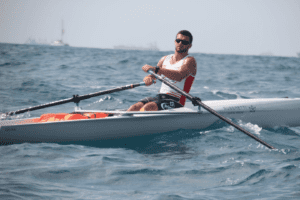A guest post from Carlos Dinares:
Hi Carlos I have a question regarding UT2/steady state training.
I’m hopping to drop 10 seconds from my 2k by the end of the year and am starting to notice that my aerobic capacity is my biggest setback. However there has always been this question I had which was, “How much steady state is too much?”. I know in the Winter you have to focus on ‘long pieces’ for the summer, but how much is too much? Can I get by, by ONLY doing UT2/steady state work, and then leave UT1 for water sessions?
The Answer
This is an interesting question…..
In order to answer this question first I’m going to give you some variables that will determine the % of each one of them you need to do:
- Age, years of good sporting development and good training.
- Goal, one 2km on an erg or several 2kms because you need to do a heat, rep, semi and final.
- Erg 2km goal or water and erg 2km goal .
- Lightweight, heavyweight.
- Male, female
- Boat class event.
- Genetics and talents you have.
- Weather, climate where you live.
- How much time you have every day
- What do you like doing most!
Wow! These are plenty of variables that you need to check or look at it from your own side in order to determine how you are going to develop your training program to go faster.
When rowers want to go 10 seconds faster on their 2km stationary erg test I always tell them that there are plenty of ways to get this improvement but not all the ways that get you there make you faster on the water.
How these 10 variables affect you
1) Age, years of good development and good training.
If you are are starting to row now and have not done any aerobic work before to develop your aerobic capacity or don’t know how to row, first you need to develop your coordination and aerobic capacity to later be the fastest you can be. If I coach a rower that has not rowed before or very little I do everything UT1 and UT2 to develop coordination and basic aerobic base. I don’t focus on early results or erg results. If you have a very good technique and very good aerobic base you can do more UT1 and lactate work.
2) Goal, one 2km on an erg or few 2km because you need t0 do a heat, rep, semi and final.
3) Erg 2km goal or water and erg 2km goal .
I’ll answer these two together: if you are a erg rower and don’t care about water rowing and only look for one time 2km test, you can do plenty of UT1 and lactate work. You don’t need to do much UT2 because you don’t care about coordination and don’t need to race several times in a few days like rowers on the water that need to go through a selection process, heat, rep, semi and final.
If you want to improve both water and erg test, you need to do plenty of UT2 on the water to develop proper technique and coordination taking good strokes. If you are preparing to race a big race your coach will check your 6km (or 5km) test time over your 2km because he will want to find out more about your aerobic base. To test well on a 6km you need to have a very good aerobic base if not you won’t score well because it is a long test. A 6 km test shows how well you can recover from each 2km race and how well you can perform over an event with several races.
4) Lightweight, heavyweight.
If you are a lightweight, doing more aerobic work will help you to keep your weight down. If you are not a lightweight rower then it is not as important because you can still race if you are not down on weight or on % of body fat. This will have an influence on the way you design your training program and % of aerobic work.
5) Male, female.
Male rowers have more power and the endurance, engine part plays a bigger role. If you are a strong male but have a bad 6km test you cannot make it. If you are a strong woman with a bad 6km you can make it.
This is my point, power in female rowers is very important because rowing is a sport of power to move the boat and in females power is not as easy to get because of many reasons like testosterone levels. Real Strong Women with a not amazing aerobic base can make it easier than men in this same position, this is my point here.
6) Boat class event.
The slowest rowing event is more or less 1 minute and 30 seconds longer than the fastest. Also you might have more races to make it to the final. If you race a slower event you will need to do more aerobic base % than if you race a fastest event.
7) Genetics and talents you have.
If you are by birth more aerobic than anaerobic, slower rather than faster you will do more of the one you are missing. If your V02 Max is really good by nature than you will be able to do more lactate work and high levels of red blood cells will help you to recover faster and better and keep healthy.
8) Weather, climate where you live.
If you row in a sunny and warm place it is easier to row long and at low intensity, UT2. If it is freezing and cold it gets harder to go at low intensity and stay out for long. UT1 can be then easier to reduce time on the water and get the body just going to stay warm.
9) How much time you have every day.
If you have “x” energy everyday and can use part of it for your training and have plenty of time you can with this “x” energy do 4 hours for example of low intensity work. If you have this “x” energy and don’t have time you can use it up in 30 minutes going at higher intensity. It depends on how much time you have. Depending on how much time you have to train, recover and eat properly will have a huge “to say” on the way you need to design your training program.
10) What do you like doing most!
At the end what makes you 10 seconds faster is training and not sitting on the sofa. To do that every single day you need to enjoy it, be sustainable over the years and have fun doing it. You need to like the work. This means that if with 20 different training programs you can go 10 seconds faster the more successful one will be the one that burns you the less to be able to go 10 seconds lower again next year.
This for me is the MOST IMPORTANT ONE because many rowers burn out because they don’t enjoy the work and nobody ask them how they are feeling and they just work like factory work. The goal is to last and be in it for the long path because it takes a long time to be the best you can be and if you quit or give up you never will get there. Stay on it and do what you like the most and you will succeed.
So that’s the answer to your question…
Plenty of steady state is NEVER too much but depending on how you answer the list above, you can get to your 10 second improvement goal faster or takes you a little longer depending how you train!
I hope this answer helps!!!
In the Rowperfect Store:
Walter Martindales e-book, Ergometer Testing for Rowers – how to prepare, race and recover from your 2k test








This Post Has 3 Comments
Hi my name is Muhammad Rahmat Ali . I live in India ..I have a question will u pls help me ??Aftter only 2months i had a Nationals rowing championship Under 15{500m race} .Can u give a awesome schedule that help me to Clock 1:30 in ergo and below 1:40 in water . My height is 170 cm and weight is 51kgs .Pls help me
I cannot help wiht a training programme but I can help you with some goals.
Tell me – what is your time for 500m now?
im a 14 yr old lightweight female w a 2k of 8:33 and I desperately need help with dropping splits! any advice on what training i should do or anything?